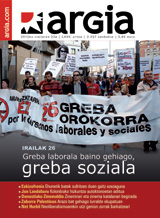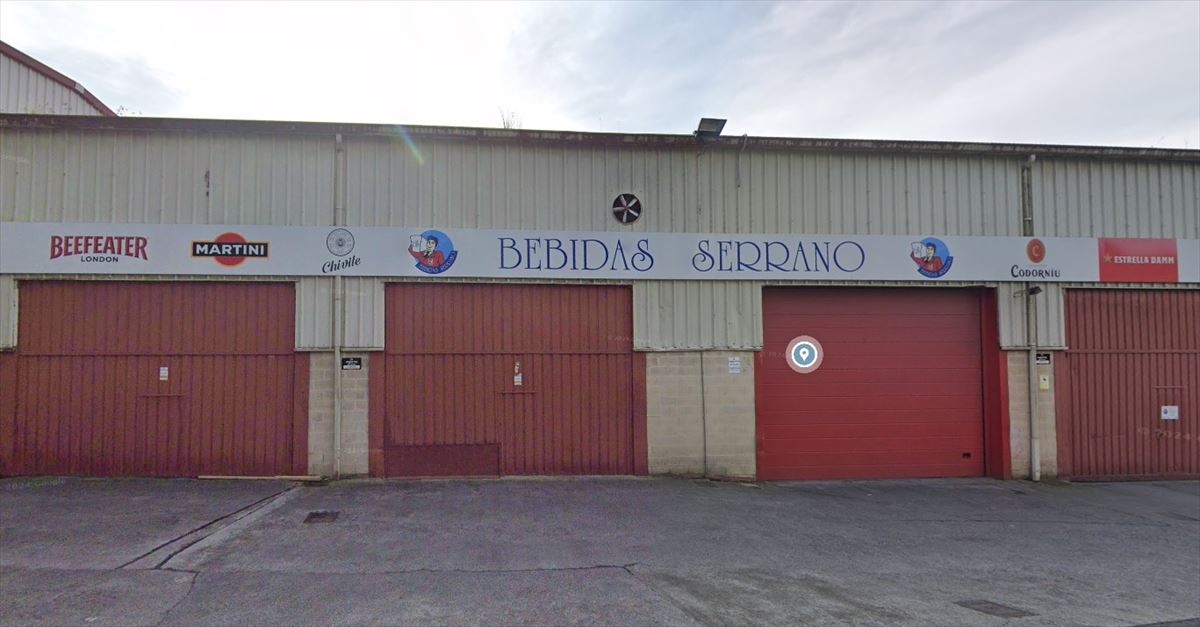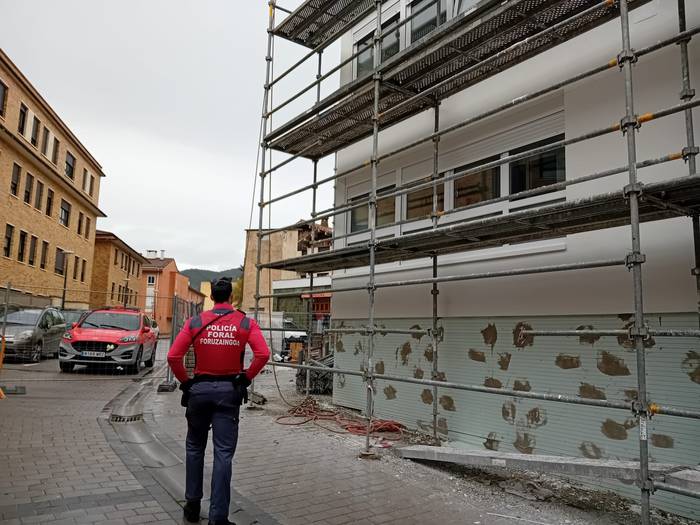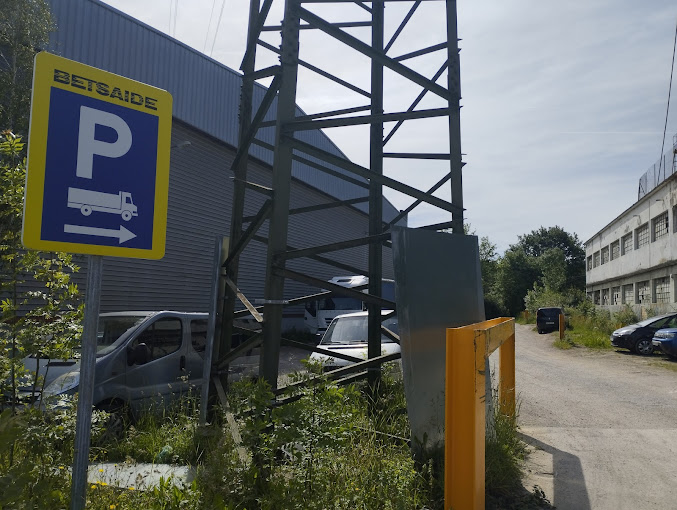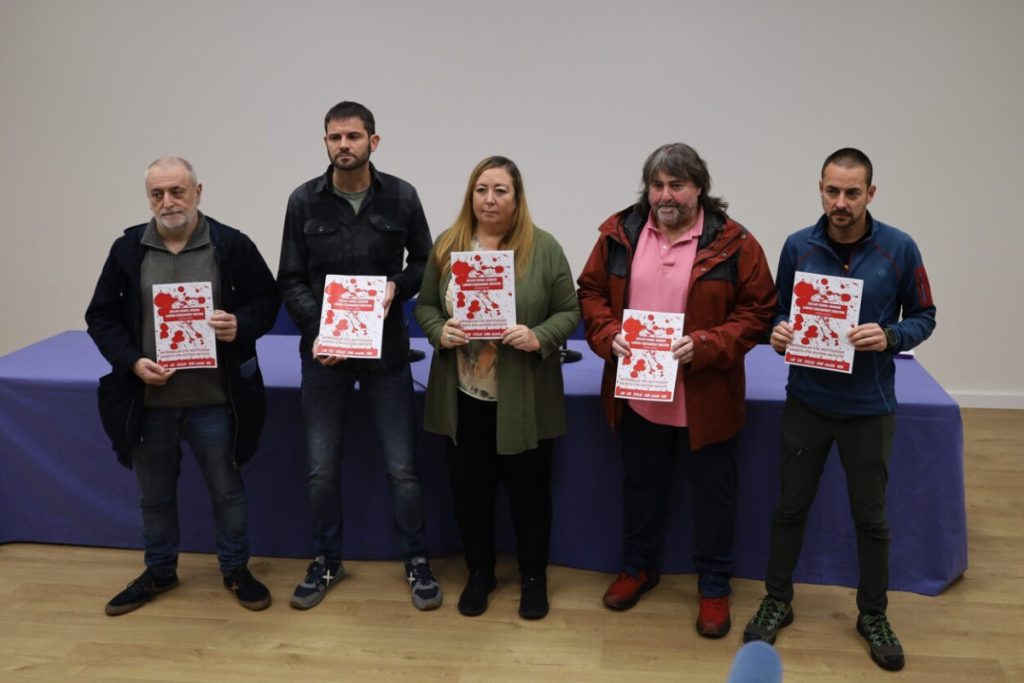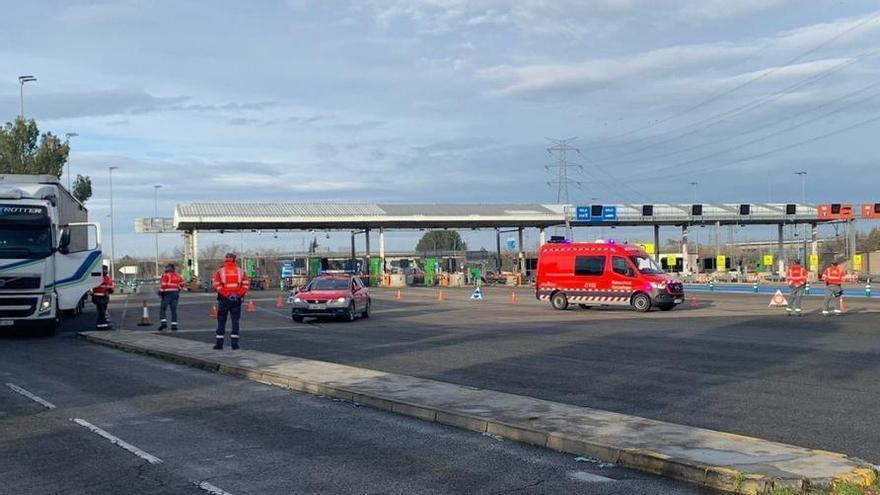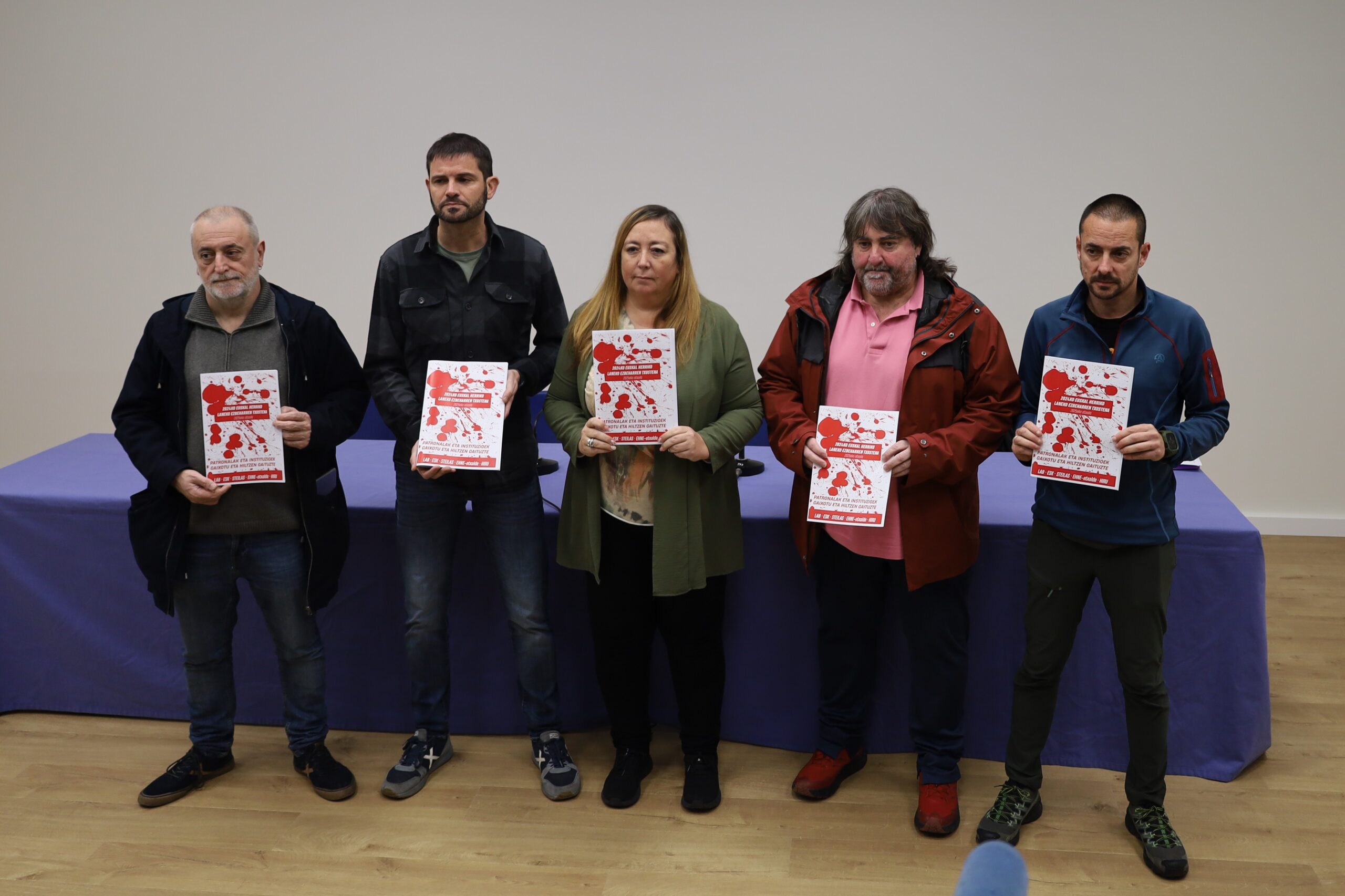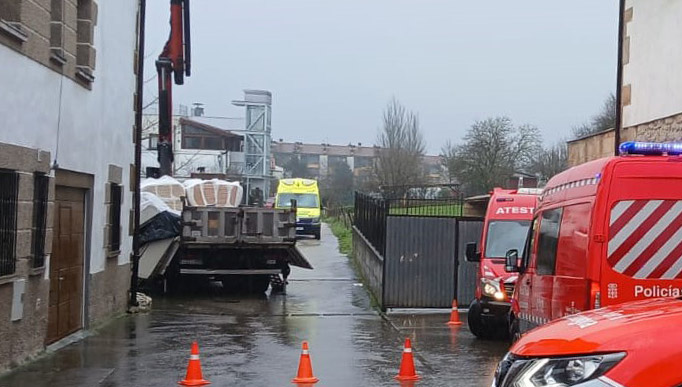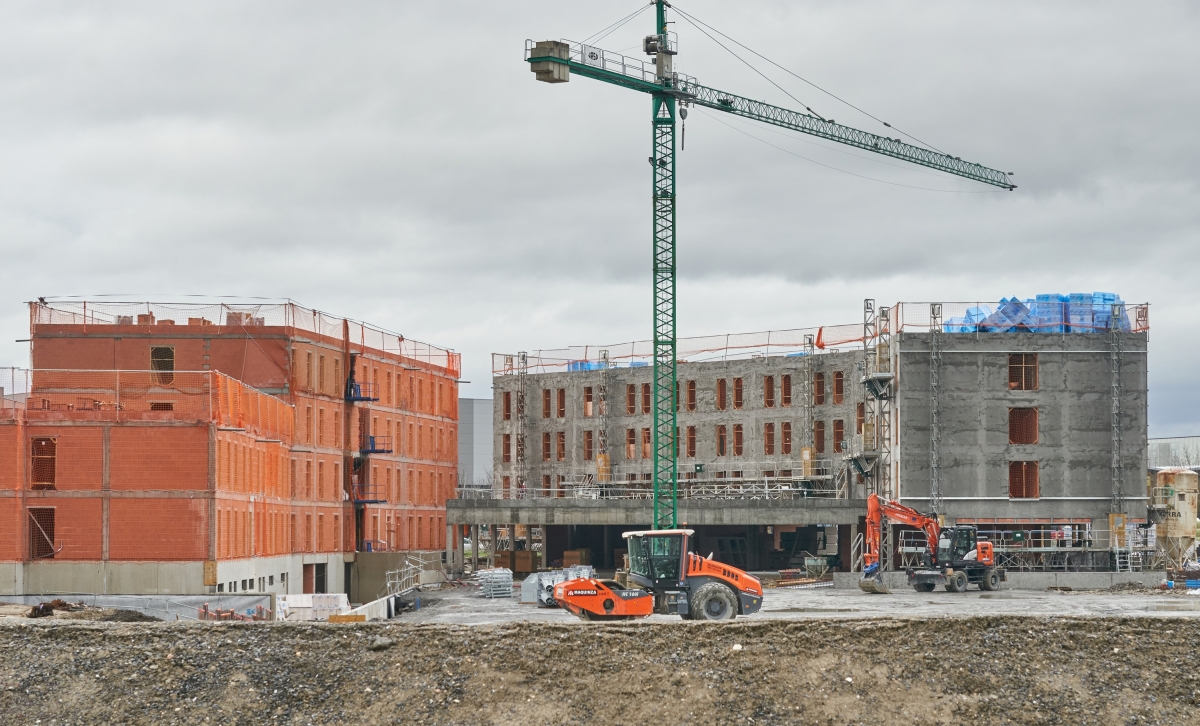"If we're not able to protect the hottest, they're not going to give us back labor rights."
- The Collective of the Unemployed of the Region of Pamplona held its first open assembly in March 2011 and since then they meet every Tuesday at 19:00 in front of the Provincial Council building. It aims to denounce current employment policies and seek solutions. The General Assembly has joined the general strike called for on 26 September. Israel González (Pamplona, 1981), member of the assembly, stated that “it has to be a social strike, rather than a work strike”.
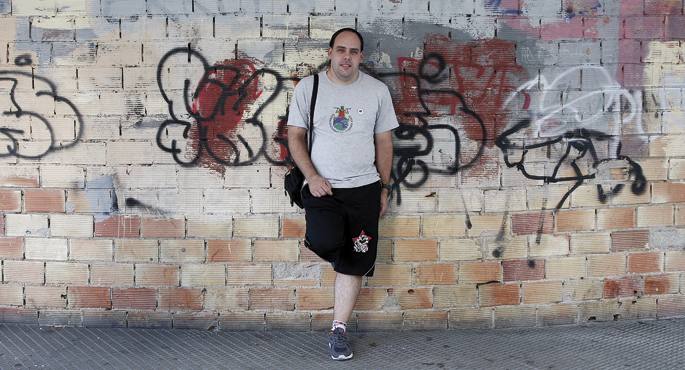
Are the unemployed still stigmatized?
It used to be a distant account, but now more and more people are unemployed. However, the stigma has not yet been broken. There are people who get home, misery, lack of money and marginalization. Getting out of this situation is very hard, seeing family and friends that you're in poverty.
Does the House help to take this step?
The assembly of the unemployed also serves to do that, to talk to the people who are in the same situation, to support them. The first assemblies seemed like an anonymous association: each one told their story, how poverty lived... There were very harsh situations. And being able to tell all of that to another person helps a lot.
What pushed you to gather?
We saw that it was necessary for the unemployed to make their demands by mouth. There are trade unions that fight factory layoffs, but once on the street, with those people who are out of work they don't do much, although it's actually the social majority. In the previous edition a data was published: 58% of the people living in Navarre are pensioners or unemployed, according to the study. Those people have to mobilize.
Therefore, the unions encouraged you…
Yes, the first meeting was organised by militants from different trade unions who were unemployed, and hence the idea of an open assembly emerged. In Plaza del Castillo we gathered around 40 people and agreed on a decalogue.
In Pamplona the unemployed have already been organized before, is this their heir?
In the 1980s, an assembly of unemployed people was held in Pamplona. Our intention is not to be a continuity, we want to bring together the people who are unemployed and to denounce our situation. Here it seems that no one is guilty; it is not possible for a press conference to say that there are a thousand more unemployed and no one takes responsibility for it.
Their motto is that you are on the street but not standing. Which of the initiatives carried out in these two years would I highlight?
Every month we have held numerous assemblies, with ups and downs in the number of participants, as we are a group without fixed militants. We have worked hard on the issue of basic income. In Navarre, a number of articles have been approved, leaving the majority of the unemployed out of this aid. They have created another aid to get work, but it seems like a joke, I think they have only received 19 people. We occupy the Social Welfare Residence of the Government of Navarra to denounce that that day we are left out of welfare.
In Navarre, the crisis has hit hard, it is the territory where unemployment has risen the most.
Companies have taken advantage of the crisis to “optimize the workforce”, ultimately dismissing people. The first reform of Zapatero and the last reform of Rajoy have contributed to this, but they also have to do with government policies. The advisors have not been able to reverse a SRE, they have signed without analysis, when it was necessary to sign… In fact, companies have been free to throw workers away.
Behind the big data there are others: the increase in the long-term unemployed, the high rate of youth unemployment… What are your concerns lately?
Employment policies no longer surprise us, they are in the midst of a dynamic of reducing public employment. The last case has been that of the library of the Casco Viejo de Pamplona, which will be managed by a private company, as the government does not have a budget to secure the salary of two workers. What most distresses us is that people are becoming totally helpless. There are some cuts approved by Madrid but managed in Navarra. We cannot eliminate basic income, complicate further aid of EUR 400, reduce unemployment by 10%... Social disprotection is becoming more widespread and sooner unthinkable. However, immigrants who are worse off at the moment are outside public health and basic income, so they have opened the door to return to their country of origin.
When you’re unemployed, all of these cuts are noticeable even more…
Most of us have never needed such aid. But you get in touch with social workers and you realize that maze is getting harder and harder, the only thing you're looking for is that people don't ask for help, they save money. They finance giant works such as the TAV or the gardens of Aranzadi, and we, on the contrary, are complicated by the maze. We are working on this issue of cutbacks with the platform of the displaced from home, with the social workers, with the collective of immigrants… We find it incredible that we say that there is no alternative; the cutbacks are right because they are right.
And what concrete solution have you proposed?
We propose the division of labour. How do you get there? In public administration, for example, overtime can be banned. In this year’s budgets EUR 5 million have been earmarked for the payment of these hours. Working hours can also be reduced to 35 hours in public and private enterprises. All this may result in the creation of 60,000 jobs in Hego Euskal Herria.Hemos transferring the proposal to the works councils for the workers to discuss it there and now we also start in the municipalities, demanding that their workers do not do extra hours and that they demand the same from private companies that subcontract through the specifications.
These measures are carried out by the Administration. But what can the citizen do on a daily basis?
We've created a kind of professional list. We have started in the Casco Viejo and Chantrea, where we point to the professionals of the neighborhood (plumbers, masons…) and try to connect the neighbors and neighbors who need these services with these skilled workers. What does a neighbor need a plumber? Well, call the plumber of the neighborhood. It's a network to generate more work in the neighborhood.
There is now a lot of talk about the social economy, about cooperatives, about workers being able to make decisions.
There is another initiative that we have recently launched: we have set up a catering cooperative to serve popular meals and events of this kind, with the aim of ensuring that people participating in the unemployed assembly have a minimum income. In addition, in one way or another, there are people working in the orchards of Aranzadi. We find it interesting to start talking about food sovereignty, especially because there are people who have nothing to eat, because they have no money for it.
Have you ever known these situations in the assemblies?
Yes, there are people spending a month with very little money, we are talking about EUR 100-150. To give you an idea: some people find it very difficult to go to the assemblies, they live on the other end of Pamplona, and paying for the euro that costs Villabesa is a sacrifice for them.
Who is to blame for the situation suffered by the citizens?
It's the same system, capitalism. And if we go further down, Angela Merkel and the European Central Bank are just an excuse, we always blame each other. Barcina's speech is that he has to comply with the rules that come from Madrid, Rajoy says that he can do nothing...
But the system we all compose.
I do not deny that we are partly to blame, because we have consumed more than we needed. But on the other hand, those who govern us have squandered public money, have built infrastructures that do not serve any purpose, there are the circuit of Los Arcos, the Navarra Arena… They are to blame, they have been based on cement rather than on people.
You asked to set up an employment bureau. How's the thing?
We were in a working parliamentary committee and we called for the setting up of an employment bureau. We proposed this idea to the parties, and some made it their own, but it has not made any other way. It is interesting to us that the unemployed have a voice and a vote at that table.
The Herri Ekimena platform was established in June. What is the point of meeting on these platforms?
It is good to bring groups and groups together at the moment, and the People’s Initiative is plural and open. It is true that there are groups grouped in other platforms, to put it mildly, more attached to other sectors. We have to look for what unites us to all social movements and work from there.
In recent times, a Works Council has convened a demonstration involving workers from other companies, as was the case with the Orkoien kayab. It seems that solidarity is increasing.
It looks like it does. The line of work and unemployment is becoming thinner, permanent employment is a dream. The crisis itself has forced workers and works councils to join. The Kayaba demonstration also involved the assembly of the unemployed, something that some journalists did not understand.
(...)
We think there has to be some kind of link between those who work and those who do not, because employers use us as blackmail to the unemployed. It happened in Inasa, in Irurtzun. “Who don’t want to work with the metal convention minimums? There are 48,000 people willing to receive your work.” As long as we do not break this blackmail, the situation will be unsustainable for those who work and do not have a job.
A general strike will take place on 26 September. Why have you protected it?
We felt it was necessary for social movements also to call for strike action, not just trade unions. Unemployed people, pensioners, young people should support and strike, fill out content that day, it has to be more a social strike than a strike laboral.Con the latest reforms the labour rights have been left to nothing and now we have to fight not to lose social rights, we have to protect the people who are most damaged. If we are unable to do so, we will not be given back labour rights.
And is that what the strike is going to do?
The previous strike served to break the coalition government in Navarra. That strike forced the PSN to step back, as many of its voters also went on strike. It has to force Barcina to go back. However, the one-day strikes should go further, serve for self-affirmation, but from there it is necessary to follow up. The day after the last strike, several friends closed down in the church of San Lorenzo to claim that the struggle must continue.
Will you do something like this again?
We are discussing among those of us who meet with the Member, but we still have nothing closed.
Zenbait urtetatik hona sarri entzuten dugun kontzeptua da zaurgarritasuna. Gaur gaurkoz, diskurtso politikoetan pertsona zaurgarriez aritzea ohikoa da. Seguru nago nik ere inoiz erabili dudala berba hori Bizilan.eus webgunean, eskubide laboralak eta prestazio sozialak azaltzeko... [+]
Economists love the charts that represent the behaviors of the markets, which are curves. I was struck by the analogy of author Cory Doctorow in the article “The future of Amazon coders is the present of Amazon warehouse workers” on the Pluralistic website. He researches the... [+]
Buñueleko (Nafarroa) kasuan, 34 urteko gizona makina batean harrapatuta geratu da. Arratzun (Bizkaia), aldiz, garabiak goi-tentsioko linea bat ukitu ostean hil da 61 urteko gizona.
Betsaide enpresan gertatu da, 08:00ak aldera. Urtea hasi denetik gutxienez bederatzi behargin hil dira.
2024ko laneko ezbeharren txostena aurkeztu dute LAB • ESK • STEILAS • EHNE-etxalde eta HIRU sindikatuek aurtengo otsailean. Emaitza larriak bildu dituzte: geroz eta behargin gehiago hiltzen dira haien lanpostuetan.
Jakina da lan ikuskariak falta ditugula geurean. Hala ere, azken egunotan datu argigarriak ematea lortu dute: lan ikuskaritzaren arabera, EAEko enpresen %64ak ez du ordutegien kontrolean legedia betetzen. Era berean, lehendakariordeak gaitzetsi du, absentismoaren eta oinarrizko... [+]









